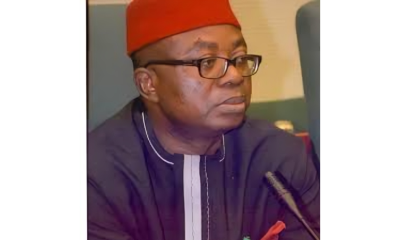economy
Lending to Governments: SGF Urges Banks to Follow FRA Rules

The Secretary to the Government of the Federation (SGF), Sen. George Akume has called on banks to follow provisions of the Fiscal Responsibility Act (FRA) when lending to Governments in the Federation and their institutions.
A statement by Bede Anyanwu, Head of Strategic Communications at the Fiscal Responsibility Commission (FRC) said Akume made the call in a keynote address at a Stakeholder Dialogue on Saturday in Lagos.
He said dialogue was aimed at promoting fiscal discipline.
Akume was represented by a staff in the SGF`s Office, Dr. David Eze.
The SGF affirmed that following the rule was to ensure that borrowing was done the right way for the right reasons to improve fiscal sustainability.
He encouraged all stakeholders to commit to more prudent management of public finances to achieve desired outcomes.
The Executive Chairman of the FRC, Victor Muruako equally called on all Nigerian banks to adhere to the provisions of the FRA 2007 in their lending practices to government and its agencies.
“The Fiscal Responsibility Act 2007 is Nigeria’s foremost legal framework for the promotion, monitoring and enforcement of fiscal discipline.
“It stipulates in Section 45(2), that lending by banks to governments or their agencies in contravention of the provisions of the Act shall be unlawful.
“PART X of the act provides guidelines for borrowing by government agencies and public institutions, including the requirement for obtaining the necessary approvals and proof of compliance to ensure the sustainability of loans.
“Recognising the critical role that loans play in driving socio-economic development, the FRC brought banks together with regulators, policy makers and government in the Stakeholder Dialogue to highlight the provisions of the FRA on responsible lending.
“Discussions focused on measures to enhance compliance to improve the nation’s debt management practices,” the statement said.
The FRC boss emphasized the importance of compliance with the FRA to improve loan performance, to maintain macro-economic stability.
“We are committed to good corporate governance, fiscal stability and the pursuit of economic development to improve the lives of citizens while improving our nation’s viability.
“We, therefore, enjoin all stakeholders to support the bold macroeconomic reform initiatives of the administration of President Bola Ahmed Tinubu by ensuring more fiscal discipline in line with the provisions of the FiscalResponsibility Act 2007 (FRA) .”
The chairman said that the provisions of the FRA serve to keep the lender, borrower, regulator, evaluator, assessor, and indeed the beneficiary of public sector loans on the same page.
Mr. Greg Jobome, Executive Director, Risk Management Division, Access Bank who responded on behalf of the banks. Said they will continue to work together with stakeholders to foster responsible lending practices, transparency, and accountability.
The FRC Stakeholder Dialogue brought together a diverse group of participants including banking Institutions, government representatives, economists, academics and experts in fiscal governance.(NAN)
economy
AEDC Restates Commitment to Pay all Legitimate Allowances to Staff

The Abuja Electricity Distribution Company (AEDC) says it is committed to settling all legitimate allowances owed staff.
The company’s Managing Director, Mr Chijioke Okwuokenye, said this in a statement in Abuja on Thursday following a threat from the workers to shutdown the operations of the establishment.
The threat notice was given by the two labour unions in electricity supply industry, the National Union of Electricity Employees (NUEE) and the Senior Staff Association of Electricity and Allied Companies (SSAEAC).
The unions had respectively resolved to resume their earlier suspended strike over non-implementation of agreements reached with the AEDC since Nov.
5 and Nov 7, 2024.The unions threatened to resume the suspended action over non-remittance of pension deductions for 16 months, non-implementation of the national minimum wage.
They also cited non-promotion and the continuous stagnation of members of staff for over 10 years, non-confirmation of staff on acting appointment, non-regularisation and proper placement of appointments amongst others.
Okwuokenye said that management had been engaging constructively with the union representatives regarding the notice of industrial action.
”We are committed to ensuring that all legitimate allowances owed to staff are settled promptly, subject to our financial processes and regulatory compliance.
”We have already initiated dialogue with the union leadership to address their concerns transparently and to seek a mutually agreeable resolution.
”We are confident that, through continued negotiation and open communication, we will find a way to avert any disruption to our operations and to uphold our commitment to the welfare of our employees, ”he said.
According to him, employees of AEDC are at the heart of all the company does, and their well-being and welfare are paramount to management.(NAN)
BUSINESS
NSIA Net Assets Hit N4.35trn in 2024
By Tony Obiechina Abuja
The Nigeria Sovereign Investment Authority (NSIA) yesterday disclosed that its net assets grew from N156bn in 2013 to N4.35 trillion in 2024.
Similarly, the Authority has remained profitable for 12 consecutive years, leading to cumulative retained earnings of N3.
74 trillion in 2024.Managing Director and Chief Executive Officer of NSIA, Aminu Umar- Sadiq made these disclosures at a media engagement in Abuja, highlighting its audited financial results for the 2024 fiscal year.
According to him, the results underscored the resilience of the authority’s investment strategy and the strength of its earnings, driven by a well-diversified revenue base and robust risk management practices, despite a challenging global macroeconomic and geopolitical environment.
Total operating profits, excluding share of profits from associates and Joint Venture (JV) entities, increased from N1.17 trillion in 2023 to N1.86 trillion in 2024, driven by the strong performance of
NSIA’s diversified investment portfolio, infrastructure assets, gains from foreign exchange movements, and derivative valuations.
In addition, Total Comprehensive Income (TCI), inclusive of share of profits from associates and JV entities, reached N1.89 trillion in 2024, reflecting a 59 per cent increase from N1.18 trillion in 2023.
Core TCI (excluding foreign exchange and derivative valuation gains) rose by 148 per cent to N407.9 billion in 2024 compared to N164.7 billion in 2023, supported by robust returns on financial assets measured at fair value through profit and loss, including collateralised securities, private equity, hedge funds, and Exchange-Traded Funds (ETFs).
Umar-Sadiq said the authority’s outstanding financial performance in 2024 reflected the “strength of our strategic vision, disciplined execution and unwavering commitment to sustainable socio-economic advancement.”
He said, “By leveraging innovation, strategic partnerships and sound risk management, we have not only delivered strong returns but also created value for our stakeholders
“As we move forward, we remain focused on driving economic transformation, expanding opportunities, scaling transformative impact and ensuring long-term prosperity for current and future generations of Nigerians.”
The CEO reaffirmed the authority’s commitment to managing the country’s SWF, and delivering the mandates enshrined in the NSIA Act.
He said NSIA remained poised to continually create long-term value for its stakeholders by delivering excellent risk-adjusted financial results, developing a healthy and well-diversified portfolio of assets and large-scale infrastructure projects, and enhancing the desired social outcomes.
He noted that NSIA was committed to its mandate of prudent management and investment of Nigeria’s sovereign wealth.
“In adherence to its Establishment Act, NSIA prioritises transparency, disclosure, and effective communication with all stakeholders and counterparties,” he said.
He pointed out that in the year under review, a new board, led by Olusegun Ogunsanya as Chairman, was appointed by President Bola Tinubu, in accordance with the provisions of the NSIA Act.
The new board will provide strategic direction and oversight, in addition to playing a pivotal role in critical decision making.
He remarked that under the guidance of the Board, the Authority will retain focus on its primary mandate of creating shared value for all stakeholders based on its continued adoption of corporate governance practices.
“NSIA prides itself an investment institution of the federation established to manage funds in excess of budgeted oil revenues and its mission is to play a pivotal role in driving sustained economic development for the benefit of all Nigerians through building a savings base for the Nigerian people, enhancing the development of the county’s infrastructure, and providing stabilisation support in times of economic misadventure,” he added.
economy
Firm Boosts Access to Dairy Nutrition with Affordable Peak Mini

From Anthony Nwachukwu, Lagos
Dairy brand, Peak Milk has boosted Nigerians’ accessibility to its quality dairy nutrition range with the introduction of the budget-friendly Peak Mini – a smaller, more affordable pack from its signature Peak Evaporated Milk.
Unveiling the dairy brand, the producer, FrieslandCampina WAMCO Nigeria PLC, restated its commitment to providing high-quality dairy products to consumers as it has been doing in over 70 years in Nigeria.
According to WAMCO, the Peak Mini evaporated milk will provide affordable breakfast within the reach of every home with a budget-friendly nutritional breakfast with the same rich, creamy taste and high-quality.
Senior Brand Manager of Peak Milk, Moninnuola Kassim, stated that with Peak Mini, the company is “directly addressing the challenges many Nigerians face daily, one of which is affordability.
“Our smaller, affordable Peak Mini packs ensure that quality dairy nutrition remains within reach for everyone, regardless of income level.”
According to her, “many consumers have had to compromise on nutrition when considering costs, but with Peak Mini, that trade-off is no longer necessary.
The brand, Kassim said, maintains the same premium taste and nutritional benefits in a convenient and cost-effective package, and whether for breakfast cereals, tea or other meals, this innovation ensures that consumers no longer need to choose between quality and affordability.
According to her, FrieslandCampina WAMCO believes that every Nigerian deserves access to quality, nutritious dairy products,” and “Peak Mini is another step towards fulfilling that mission by providing a practical solution that meets the needs of everyday consumers.”
| ReplyReply allForwardAdd reaction |



























